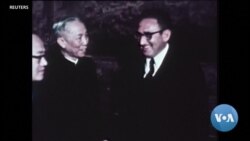ທ່ານເຮັນຣີ ຄິສຊິນເຈີ, ອະດີດທີ່ປຶກສາດ້ານຄວາມໝັ້ນຄົງແຫ່ງຊາດ ແລະເປັນລັດຖະມົນຕີການກະຊວງການຕ່າງປະເທດ ຜູ້ທີ່ມີອິດທິພົນຢູ່ໃນທົ່ວໂລກ ໄດ້ແກ່ຍາວເວລາຂອງການດໍາລົງຕໍາແໜ່ງພາຍໃຕ້ອະດີດປະທານາທິ ບໍດີ ຣິເຈີດ ນິກສັນ (Richard Nixon), ໄດ້ເຖິງແກ່ກຳ ຮວມອາຍຸໄດ້ 100 ປີ, ຢູ່ທີ່ເຮືອນພັກຂອງທ່ານໃນລັດຄອນເນັກຕິກັດ. ການເຖິງແກ່ກຳຂອງທ່ານໄດ້ຖືກປະກາດໂດຍບໍລິສັດທີ່ປຶກສາຂອງທ່ານ ແລະບໍ່ໄດ້ໃຫ້ເຫດຜົນໃດໆເພີ້ມຕື່ມ. ນັກຂ່າວການທູດອະວຸໂສ ຊິນດີ ເຊນ ມີລາຍງານກ່ຽວກັບຊີວິດ ແລະມູນ ເຊື້ອຊຶ່ງເປັນທີ່ໂຕ້ຖຽງ ພ້ອມດ້ວຍການສະເຫຼີມສະຫຼອງຂອງລັດຖະບຸລຸດອາເມ
ຣິກັນ, ເຊິ່ງ ທິບສຸດາ ມີລາຍລະອຽດ.
ທ່ານເຮັນຣີ ຄິສຊິນເຈີ ເກີດມາໃນຊື່ ຮາຍສ໌ ອາລເຟຣດ ຄິສຊິນເຈີ (Heinz Alfred Kissinger) ໃນວັນທີ 27 ພຶດສະພາ ປີ 1923, ໃນເມືອງເຟີຣທ໌ (Fuerth), ປະເທດເຢຍຣະມັນ.
ທ່ານ ແລະຄອບຄົວຂອງທ່ານ ເຊິ່ງເປັນຊາວຢິວ, ໄດ້ພາກັນເຂົ້າມາສະຫະລັດໃນປີ 1938 ເພື່ອຫຼົບຫນີຈາກພວກ ນາຊີ (Nazis). ທ່ານໄດ້ເຂົ້າຮ່ວມກອງ ທັບສະຫະລັດໃນລະຫວ່າງສົງຄາມໂລກຄັ້ງທີສອງ, ແລະຈາກນັ້ນ ໄດ້ສຶກສາຢູ່ທີ່ມະຫາວິທະຍາໄລຮາເວີດ (Harvard) ແລະເຂົ້າຮ່ວມຄະນະອາຈານສອນ.
ເມື່ອທ່ານເຂົ້າຮັບຕຳແໜ່ງ ໃນປີ 1969, ປະທານາທິບໍດີໃນເວລານັ້ນ ທ່ານຣີ-ເຈີດ ນິກສັນ ໄດ້ເລືອກເອົາ ທ່ານຄິສຊິນເຈີ ມາເປັນທີ່ປຶກສາດ້ານຄວາມໝັ້ນຄົງແຫ່ງຊາດ. ຕໍ່ມາ ທ່ານຍັງໄດ້ຖືກແຕ່ງຕັ້ງໃຫ້ເປັນລັດຖະມົນຕີການຕ່າງປະ ເທດ, ເຊິ່ງກາຍເປັນບຸກຄົນທໍາອິດ ທີ່ກໍາທັງສອງຕໍາແຫນ່ງໃນເວລາດຽວກັນ.
ທ່ານຄິສຊິນເຈີ ຍັງໄດ້ສ້າງຕັ້ງເຄື່ອງໝາຍການຄ້າຂອງຕົນໃນຊື່ "realpolitik," ໂດຍອີງໃສ່ນະໂຍບາຍຕ່າງປະເທດກ່ຽວກັບສິ່ງທີ່ທ່ານກ່າວວ່າ ເປັນພາກປະຕິ ບັດ, ແທນທີ່ຈະເປັນການຕັດສິນໃຈໃນທາງສິນທໍາ. ທ່ານອາຣອນ ເດວິດ ມີລເລີ (Aaron David Miller) ໄດ້ປະຕິບັດໜ້າທີ່ເປັນຜູ້ເຈລະຈາໃຫ້ແກ່ການປົກ ຄອງຂອງພັກຣີພັບບລີກັນ ແລະພັກເດໂມແຄຣັດຈຳນວນນຶ່ງ, ແຕ່ບໍ່ແມ່ນຢູ່ພາຍໃຕ້ທ່ານຄິສຊິນເຈີ.
ທ່ານອາຣອນ ເດວິດ ມີລເລີ, ຈາກສູນບໍລິຈາກຄາເນກີ (Carnegie) ເພື່ອສັນຕິພາບສາກົນ ກ່າວຜ່ານຊູມວ່າ:
“ຜູ້ທີ່ທໍາລາຍທ່ານ ຈະໂຕ້ຖຽງວ່າ ທ່ານໂຫດຮ້າຍ ແລະໃຈແຂງ. ບາງຄົນໂຕ້ຖຽງ, ແລະນັ້ນ ອາດຈະເປັນຄວາມຈິງຂອງຜູ້ນໍາອາເມຣິກາຈໍານວນໃດກໍ່ຕາມ ທີ່ທ່ານຄວນໄດ້ຮັບການປະຕິບັດ ໃນຖານະອາຊະຍາກອນສົງຄາມກ່ຽວກັບກໍາປູເຈຍ, ກໍາປູເຈຍ ແລະ ລາວ. ນະໂຍບາຍຂອງທ່ານຕໍ່ບັງກລາແດັສ ໃນຕົ້ນຊຸມປີ 1970. ແຕ່ຄວາມເປັນຈິງກໍຄືວ່າ ທ່ານຍັງມີຜົນຕໍ່ດ້ານການທູດ ໃນທິດທາງທີ່ມີລັກສະນະພິເສດ.”
ທ່ານຄິສຊິນເຈີ ບໍ່ໄດ້ເປີດເຜີຍການກ່ຽວກັບຖິ້ມລະເບີດທາງອາກາດຂອງສະຫະລັດໃສ່ກຳປູເຈຍ ແລະ ລາວ ໃນປີ 1969 ຕໍ່ລັດຖະສະພາ, ເຊິ່ງເຮັດໃຫ້ສົງຄາມຢູ່ໃນຫວຽດນາມຮ້າຍແຮງເພີ່ມຂຶ້ນ.
ແຕ່ ກໍຍັງແມ່ນ ທ່ານ ຄິສຊິນເຈີ ທີ່ໄດ້ພົບປະກັບ ທ່ານເລ ດັກ ຖໍ (Le Duc Tho) ຂອງຫວຽດນາມເໜືອຫຼາຍສິບຄັ້ງ ເພື່ອເຈລະຈາຍຸຕິສົງຄາມ, ເຊິ່ງພວກເຂົາເຈົ້າທັງສອງ ໄດ້ຮັບລາງວັນໂນເບລຂະແໜງສັນຕິພາບໃນປີ 1973. ແຕ່ ທ່ານເລ ດັກ ຖໍ ໄດ້ປະຕິເສດລາງວັນດັ່ງກ່າວ.
ທ່ານຄິສຊິນເຈີ ມີການພົວພັນກັບ ຈີນ ໃນປີ 1972, ເຊິ່ງເພິ່ນໄດ້ວາງແນວ ທາງໃຫ້ປະທານາທິບໍດີ ນິກສັນ ໄປຢ້ຽມຢາມປະເທດຄອມມິວນິສໃນເວລານັ້ນ ເພື່ອພົບປະກັບປະທານປະເທດຈີນ ທ່ານເໝົາ ເຈີຕຸງ, ຊຶ່ງເປັນຄັ້ງທຳອິດຂອງປະທານາທິບໍດີສະຫະລັດ.
ນີ້ ຖືວ່າເປັນໄຊຊະນະອັນຍິ່ງໃຫຍ່ຂອງ ທ່ານຄິສຊິນເຈີ, ແຕ່ ທ່ານແຈຣອດ ເຮສ (Jarrod Hayes) ຈາກມະຫາວິທະຍາໄລແມັດຊາຈູເຊັດ, ໃນເມືອງໂລ ມີທັດສະນະທີ່ແຕກຕ່າງກັນ, ໂດຍກ່າວວ່າ ທ່ານຄິສຊິນເຈີ ເປັນຜູ້ຊ່ຽວຊານໃນການສ້າງພາບ.
ທ່ານແຈຣອດ ເຮສ, ກ່າວຜ່ານຊູມວ່າ:
"ທ່ານໄດ້ປ່ຽນແນວຄວາມຄິດກ່ຽວກັບການທູດ ໂດຍຜ່ານການປະຕິບັດວຽກງານທາງການທູດຂອງທ່ານ, ທ່ານເຮັດໃຫ້ມັນມີຄວາມໂດດເດັ່ນ, ທ່ານເຮັດໃຫ້ມັນຫນ້າສົນໃຈ. ທ່ານເຮັດມັນໄດ້, ເຈົ້າຮູ້ບໍ, ຖ້າຫາກວ່າ ພວກທ່ານຈະມີຄວາມຕື່ນ ເຕັ້ນ. ແລະດັ່ງນັ້ນ, ທີ່ເຮັດໃຫ້ທ່ານຄິສຊິນເຈີເຂັ້ມແຂງ ໃນຖານະເປັນເຄື່ອງໝາຍກ່ຽວກັບນະໂຍບາຍການຕ່າງປະເທດ. ແຕ່ຖ້າພວກເຈົ້າຫາກລອກເອົາເຄື່ອງໝາຍນັ້ນອອກ, ຖ້າເຈົ້າເຂົ້າໄປຢູ່ໃຕ້ພື້ນຂອງມັນ, ມັນບໍ່ແມ່ນບັນທຶກນະໂຍບາຍຕ່າງປະເທດ ທີ່ຮັບໃຊ້ສະຫະລັດໂດຍສະເພາະ."
ທ່ານຄິສຊິນເຈີ ໄດ້ແນະນໍາປະທານາທິບໍດີອາເມຣິກາທຸກຄົນນັບຕັ້ງແຕ່ ທ່ານ ນິກສັນ ໄປຈົນຮອດປະທານາທິບໍດີ ໂຈ ໄບເດັນ, ຜູ້ທີ່ບໍ່ໄດ້ເຊື້ອເຊີນທ່ານໃຫ້ໄປຫ້ອງການຮູບໄຂ່ ຢູ່ໃນທໍານຽບຂາວ.
ສາດສະດາຈານທາງດ້ານປະຫວັດສາດ ທ່ານໄມໂຄລ ກິມເມຈ (Michael Kimmage) ເວົ້າວ່າ ການມີອິດທິພົນມາເປັນເວລາຍາວນານຂອງທ່ານ ແມ່ນບໍ່ມີຜູ້ໃນສົມທຽບໄດ້. ແຕ່ທ່ານບໍ່ເຊື່ອວ່າ ປັດຊະຍາຂອງ ທ່ານຄິສຊິນເຈີ ກ່ຽວກັບ "Realpolitik", ຫຼື ນະໂຍບາຍທີ່ອີງໃສ່ຜົນປະໂຫຍດຢ່າງແທ້ຈິງ ທີ່ແຍກອອກຈາກຄຸນຄ່ານັ້ນ, ໄດ້ຮັບຊະນະ ໃນນະໂຍບາຍການຕ່າງປະເທດ ຂອງອາເມຣິກັນ.
ທ່ານໄມໂຄລ ກິມເມຈ ກ່າວຜ່ານຊູມວ່າ:
"ຂ້າພະເຈົ້າຄິດວ່າ ທ່ານຄິສຊິນເຈີເອງຮູ້ດີວ່າ ຄວາມເຄັ່ງຕຶງທີ່ແຈ່ມແຈ້ງກ່ຽວກັບນະໂຍບາຍການຕ່າງປະເທດຂອງອາເມຣິກັນ ແມ່ນສິ່ງທີ່ສາມາດອະທິບາຍໄດ້ວ່າເປັນລັດທິສາກົນເສລີນິຍົມ, ຫຼື "Wilsonianism" ທີ່ກ່ຽວຂ້ອງກັບປະທານາ ທິບໍດີ ວູດໂຣວ ວີລສັນ (Woodrow Wilson), ຜູ້ທີ່ສ້າງຕັ້ງ ສັນນິບາດຊາດ ແລະຕໍ່ສູ້ກັບສົງຄາມໂລກຄັ້ງທີນຶ່ງພາຍໃຕ້ຄໍາວ່າ ‘ເຮັດໃຫ້ໂລກປອດໄພ ເພື່ອປະຊາທິປະໄຕ’. ນີ້ແມ່ນປະເພນີທີ່ແຈ່ມແຈ້ງຂອງນະໂຍບາຍການຕ່າງປະເທດອາເມຣິກັນ, ແລະ ທ່ານຄິສຊິນເຈີ ແມ່ນປະເພດຂອງຄູ່ແຂ່ງກ່ຽວກັບສິ່ງນັ້ນ. ແລະໃນຄວາມຫມາຍດັ່ງກ່າວນັ້ນ, ຂ້າພະເຈົ້າບໍ່ຄິດວ່າ ທ່ານຈະຊະນະການໂຕ້ຖຽງກັນໃນທິດທາງໃດໆກໍ່ຕາມ."
ທ່ານຄິສຊິນເຈີ ເຮັດໃຫ້ເກີດຄວາມຂັດແຍ້ງຫຼາຍຂຶ້ນໃນປີ 2022, ເມື່ອທ່ານໄດ້ເວົ້າຄືວ່າ ຢູເຄຣນ ຄວນກຽມພ້ອມໃຫ້ສໍາປະທານດິນແດນ ເພື່ອສິ້ນສຸດການຮຸກຮານຂອງ ຣັດເຊຍ.
Henry Kissinger, the former National Security Advisor and Secretary of State whose global influence long outlasted his time in office under former President Richard Nixon, has died at age 100, at his home in Connecticut. His death was announced by his consulting firm and no cause was given. Senior Diplomatic Correspondent Cindy Saine reports on the life and legacy of a controversial and celebrated American statesman.
Henry Kissinger was born Heinz Alfred Kissinger on May 27, 1923, in Fuerth, Germany.
He and his family, who were Jewish, fled to the United States in 1938 to escape the Nazis. He joined the U.S. Army during the Second World War, and then studied at Harvard University and joined the faculty.
When he came into office in 1969, then-President Richard Nixon chose Kissinger as his national security advisor. He was later also named as secretary of state, becoming the first person to hold both positions at once.
Kissinger established his own brand of “realpolitik”, basing foreign policy on what he said were practical, rather than moral decisions. Aaron David Miller served as a negotiator for a number of Republican and Democratic administrations, but not under Kissinger.
Aaron David Miller, The Carnegie Endowment for International Peace)) ((Mandatory Zoom Courtesy
“His detractors will argue that he was cruel and callous. Some argue, and that could be true of any number of American leaders, that he ought to be treated as a war criminal, on Cambodia, Cambodia and Laos …his policies toward Bangladesh in the early 70s. But the reality is that he also impacted diplomacy in ways that were quite extraordinary.”
Kissinger did not reveal the 1969 U.S. aerial bombings of Cambodia and Laos to Congress, which escalated the Vietnam War.
But it was also Kissinger who met dozens of times with Le Duc Tho of North Korea to negotiate an end to the war, for which they both were awarded the Nobel Peace Prize in 1973. Le Duc Tho refused it.
Kissinger engaged with China in 1972, setting the stage for then President Nixon’s visit to the Communist country to meet with Chairman Mao Zedong, the first by a U.S. president.
Jarrod Hayes is an associate professor of international relations at the University of Massachusetts, Lowell. He spoke to VOA via Zoom.
This was counted as one of Kissinger’s big triumphs, but Jarrod Hayes of the University of Massachusetts, Lowell has a different view, saying Kissinger was a master at branding.
Jarrod Hayes, University of Massachusetts, Zoom.
“He changed the conception of diplomacy through his practice of shuttle diplomacy, he made it high profile, he made it interesting. He made it, you know, sexy, if you will. And so that, that cements him as a foreign policy brand. But if you peel back that brand, if you if you go beneath the surface, it's not a foreign policy track record that has served the United States particularly well.”
Kissinger advised every American president since Nixon, up until President Joe Biden, who did not invite him to the Oval Office.
His long-standing influence is unrivaled, history professor Michael Kimmage says. But he does not believe that Kissinger’s philosophy of “Realpolitik”, or a purely interest-based policy divorced from values, has prevailed in American foreign policy.
Michael Kimmage, Catholic University of America, Zoom
“I think that he himself is very aware that the dominant strain of American foreign policy is what could be described as liberal internationalism, or “Wilsonianism” associated with President Woodrow Wilson, who established the League of Nations and fought the first World War under the phrase, ‘make the world safe for democracy’. This is really the dominant tradition of American foreign policy, and Kissinger is sort of an opponent of that. And in that sense, I don't think he has, in any respect, won the argument.”
Kissinger triggered more controversy in 2022, when he appeared to say Ukraine should be prepared to make territorial concessions to end Russia’s invasion.





